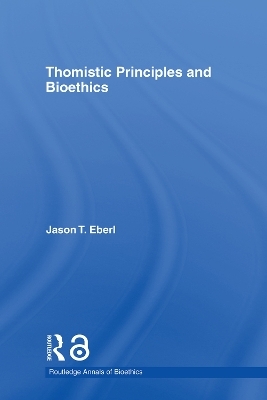
Thomistic Principles and Bioethics
Seiten
2006
Routledge (Verlag)
978-0-415-77063-7 (ISBN)
Routledge (Verlag)
978-0-415-77063-7 (ISBN)
Alongside a revival of interest in Thomas Aquinas' thought (Thomism) in philosophy, this book reveals its contemporary relevance when addressing certain complex, morally difficult, issues in bioethics.
Alongside a revival of interest in Thomism in philosophy, scholars have realised its relevance when addressing certain contemporary issues in bioethics. This book offers a rigorous interpretation of Aquinas's metaphysics and ethical thought, and highlights its significance to questions in bioethics.
Jason T. Eberl applies Aquinas’s views on the seminal topics of human nature and morality to key questions in bioethics at the margins of human life – questions which are currently contested in the academia, politics and the media such as:
When does a human person’s life begin? How should we define and clinically determine a person’s death?
Is abortion ever morally permissible? How should we resolve the conflict between the potential benefits of embryonic stem cell research and the lives of human embryos?
Does cloning involve a misuse of human ingenuity and technology?
What forms of treatment are appropriate for irreversibly comatose patients? How should we care for patients who experience unbearable suffering as they approach the end of life?
Thomistic Principles and Bioethics presents a significant philosophical viewpoint which will motivate further dialogue amongst religious and secular arenas of inquiry concerning such complex issues of both individual and public concern.
Alongside a revival of interest in Thomism in philosophy, scholars have realised its relevance when addressing certain contemporary issues in bioethics. This book offers a rigorous interpretation of Aquinas's metaphysics and ethical thought, and highlights its significance to questions in bioethics.
Jason T. Eberl applies Aquinas’s views on the seminal topics of human nature and morality to key questions in bioethics at the margins of human life – questions which are currently contested in the academia, politics and the media such as:
When does a human person’s life begin? How should we define and clinically determine a person’s death?
Is abortion ever morally permissible? How should we resolve the conflict between the potential benefits of embryonic stem cell research and the lives of human embryos?
Does cloning involve a misuse of human ingenuity and technology?
What forms of treatment are appropriate for irreversibly comatose patients? How should we care for patients who experience unbearable suffering as they approach the end of life?
Thomistic Principles and Bioethics presents a significant philosophical viewpoint which will motivate further dialogue amongst religious and secular arenas of inquiry concerning such complex issues of both individual and public concern.
Indiana University, Indianapolis, USA
Introduction 1. Aquinas’s Account of Human Nature and Natural Law Theory 2. The Beginning of a Human Person’s Life 3. The End of a Human Person’s Life 4. Issues at the Beginning of Human Life 5. Issues at the End of Human Life Notes Bibliography Index
| Erscheint lt. Verlag | 14.7.2006 |
|---|---|
| Reihe/Serie | Routledge Annals of Bioethics |
| Verlagsort | London |
| Sprache | englisch |
| Maße | 156 x 234 mm |
| Gewicht | 380 g |
| Themenwelt | Geisteswissenschaften ► Philosophie ► Ethik |
| Geisteswissenschaften ► Philosophie ► Metaphysik / Ontologie | |
| Geisteswissenschaften ► Philosophie ► Philosophie des Mittelalters | |
| Religion / Theologie ► Christentum ► Kirchengeschichte | |
| Naturwissenschaften ► Biologie | |
| Sozialwissenschaften ► Soziologie | |
| ISBN-10 | 0-415-77063-7 / 0415770637 |
| ISBN-13 | 978-0-415-77063-7 / 9780415770637 |
| Zustand | Neuware |
| Haben Sie eine Frage zum Produkt? |
Mehr entdecken
aus dem Bereich
aus dem Bereich
von Athanasius bis Gregor dem Großen
Buch | Softcover (2024)
C.H.Beck (Verlag)
CHF 18,90
eine Geschichte der christlichen Kunst
Buch | Hardcover (2024)
C.H.Beck (Verlag)
CHF 44,75


